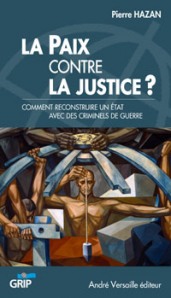Pierre Hazan (Sciences Po)
De l’ex-Yougoslavie au Soudan, du Proche-Orient au Cambodge, la question de l’intervention de la justice internationale se pose désormais à chaque conflit, suscitant immanquablement de virulentes controverses. Deux thèses s’affrontent: les uns ne voient dans cette justice qu’une arme utilisée ou délaissée par les gouvernements selon leurs intérêts du moment; d’autres considèrent au contraire la lutte contre l’impunité comme le socle d’un Etat de droit et d’une société démocratique.
La justice est-elle un obstacle ou une condition à la paix? Est-elle indispensable pour reconstruire des sociétés et rétablir une paix durable? A travers des cas concrets (ex-Yougoslavie, Libéria, Soudan, Liban…), Pierre Hazan analyse les effets de cette nouvelle diplomatie judiciaire.
Président de séance : Pierre Hassner (CERI Sciences Po)
Discutant: Guillaume Devin (Sciences Po)
CERI 17.00 – 19.00
